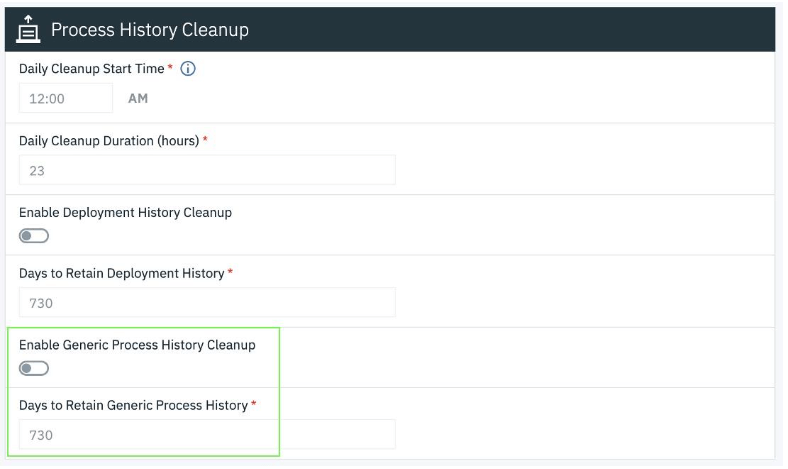We are excited to announce the release of our continuous integration and continuous delivery solution, HCL Launch version 7.3.2.0. This version marks a significant milestone, as it encompasses critical bug fixes and security enhancements to ensure a more reliable and secure experience for our users.
- Users can submit new deployments while in maintenance mode
A new role level security permission is added that grants users the ability to perform deployments even when maintenance mode is active. This feature primarily targets Admin users, enabling them to validate the system’s functionality before disabling maintenance mode and allowing regular users to initiate deployments.

- Split agent properties into versioned and non-versioned properties
Properties defined by users for an Agent are now separated from the out-of-box Agent Properties. They are available from the User Defined Properties in the Web UI as shown below:

Agent Properties that are not user defined come from the agent itself. These properties are not versioned and will be updated on agent restart. User Defined Properties are versioned, and the system will prevent the user from overwriting values from the Agent Properties. Both properties can be resolved in the same way as before.
- Added custom claims in an OpenConnect ID authentication realm
New custom claims are added to populate default user email and actualName in an OpenConnect authentication realm.

When configuring OIDC, you can now specify these optional attributes to define a custom claim. This attribute will be used to look up the email and name of a user object created in Launch.
- Included generic process history cleanup setting
As an enhancement to the current cleanup process, you can now choose to remove generic process history that are run manually. Previously, generic processes run from the Processes tab would not be cleaned up. This cleanup is now managed in System Settings as shown below:


- System setting should prevent environment delete dialog from deleting base resources
The environment deletion dialog now uses the “Enable Deleting Resources Directly From Environments” option found in System Settings as shown below:

Prior to this, users could ‘Delete Attached Resources’ on an environment and it was not clear that they were deleting the resources globally. Now, this option is turned off by default.
Should you enable this feature in System Settings, there is a warning dialog that appears to make sure the end user understands that global resources are being deleted as shown below:

- Added the following CLI commands for read and write resource role properties
The following CLI commands were added in the 7.3.2.0 release:
- deleteResourceRoleProperty
- getResourceRoleProperties
- getResourceRoleProperty
- setResourceRoleProperty

- Expanded the set of team/type mappings that can be used when creating objects
To create an object, the user must be granted at least “Create” permission for each team from the requested mappings. For each team where the user is granted both “Create” and “Manage Teams” by a single type, and there is at least one requested mapping that permits “Manage Teams” on that team, then the object can also be created with any other types for that team, even if a type that grants creation isn’t requested for that same team.
If the user is not granted both permissions as described, then the requested mappings may only include types that grant “Create” permission on that team. Otherwise, creation is denied.
- Introduced mapping of deployment properties with the configuration property sheet
This feature will help when you debug deployment failures and to identify issue in the related property sheet.
- Added new z/OS component version property that indicates repository type
The new z/OS component version property ucd.repository.type allows values as HFS and Codestation
- The following updates were included in this release:
- Jettison 1.5.4
- Json-smart 2.4.9
- Jetty to 9.4.51
- Groovy 3.0.17+ to support Java 21
- Tomcat to 8.5.89 and 9.0.75
- SnakeYAML to 2.0
Summary of What’s New in 7.3.2.0
• New features (RFEs)
-
-
- DEPLOY-14140 Add the ability to submit deployments while in maintenance mode
- DEPLOY-14152 Include generic process logs in cleanup
- DEPLOY-369 Add CLI commands to read and write resource role properties
-
• New and QoL Features
-
-
- DEPLOY-14609 Expand set of team/type mappings that can be used when creating objects
- DEPLOY-14611 Add create with team assignment permission
- DEPLOY-14201 Configure custom claims to populate email, and actualName
- DEPLOY-14512 Help users map deployment properties to configuration
- DEPLOY-13537 Split agent properties into a versioned and non-versioned section.
- DEPLOY-14435 System setting should prevent environment delete dialog from deleting base resources
-
• Other things
-
-
- DEPLOY-14468 Verify SQL Server has read committed snapshot enabled or abort server start
- DEPLOY-14441 Add System Settings to diagnostics bundle
- DEPLOY-14658 Log CPU architecture in debugging info
- DEPLOY-14508 Remove support for WinRS
- DEPLOY-14400 Remove old plugin versions stored by the agent
- DEPLOY-14711 Port FileUtils plugin “Copy Directory” step to Java
-
For more details, refer to the following release note.
HCLSoftware would also like to invite you to our next Webinar. On August 30th we’ll reflect on some of the more powerful HCL Launch capabilities already available to handle your most complex deployment situations in technically diverse enterprises. Register Today!



